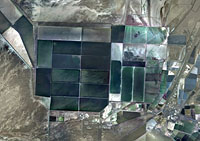![]()
AVATAR'S PARALLEL WORLD
You may know more about the movie Avatar than you do about mining in Tibet, but the movie offers uncanny parallels to the situation on the Roof of the World. Tibet is the largest colony in the world. Tibet is under military occupation by Chinese troops. Tibet is being ruthlessly exploited for its valuable minerals, against the wishes of the inhabitants, who deeply resent what is happening to their land.
In Avatar, the action takes place some 150 years into the future, on a distant moon called Pandora. Here, rapacious foreign CEOs and military figures seek a mineral of astronomical value called unobtanium. The only thing stopping them in this endeavour is the blue-skinned Na'vi, who refuse to allow mining on their sacred ground. Tibetans have, throughout their history, prevented mining of their land—which they regard as sacred.
Today, there are many valuable minerals being extracted in Tibet by Chinese and foreign companies. And one alone would qualify for the status of unobtanium. That's lithium. Lithium is used for making batteries for computers, cellphones and many other gadgets. And lithium is a very rare mineral, in very short global supply. Tibet has emerged as one of the world's largest sources for the making of lithium carbonate, a process involving extraction from Tibet's salt lakes. In fact, if your laptop, iPad or cellphone was assembled in China, you probably carry a tiny piece of Tibetan lithium around in the battery for the device.
Demand for Lithium will soar as electric vehicles with lithium-ion powered batteries hit the market. The futuristic Nissan Leaf hatchback, a pricey all-electric car, runs on a 250-kg lithium-ion battery that pours current into the 80kW AC brushless electric motor, which drives the front wheels. China's Great Wall Motors plans to market all-electric cars. In 2012, Coda Automotive (California, USA) and China's Great Wall Motors announced plans to co-develop the Coda Sedan, an affordable electric vehicle, for markets in China, North America, and Europe. Lithium iron-phosphate cells for the Coda Sedan's 454-kilogram battery pack are from LIO Energy Systems, a joint venture of Coda and China's Tianjin Lishen Battery Co. However, quality and safety could be issues for concern with Great Wall Motors. Since introduction to Australia in 2009, Great Wall Motors vehicles have been subject to four recalls on safety issues. Thousands of low-cost vehicles made by Great Wall Motors were recalled in Australia after the cars' engine and exhaust gaskets were found to contain asbestos.
